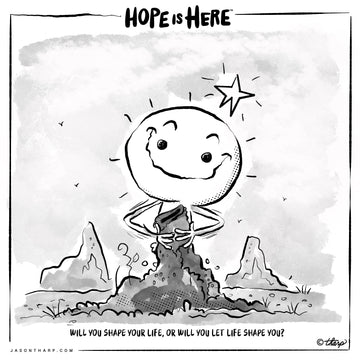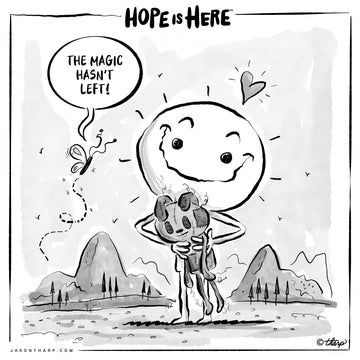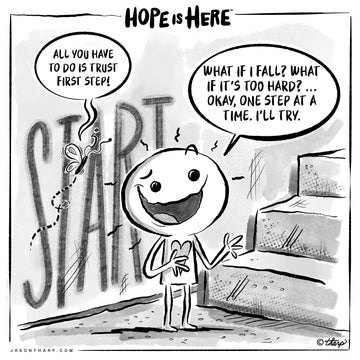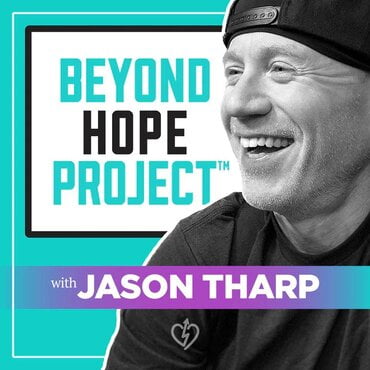Survival Isn't a Straight Line
Survival isn't a straight line. It's a spiral. No matter how many years you've been navigating a cancer diagnosis, chronic illness, or life-altering setback, the truth is: it's never easy. For so long, we've been programmed to think that throwing enough medicine, treatment, or willpower at something makes survival easier. But that's far from the truth. Survival is waking up each day and meeting it fresh—not dragging yesterday's troubles into today's possibilities. This is the story of what it means to survive brain cancer, honor the caregivers who hold us up, and find courage by turning toward our fears with gratitude.
All of this is much easier said than done.
I've been at this for four years, and I still fall into the spiral. The one that starts with a single question: "What is happening to my body today?"
The Dinner in New York
My wife Becky and I were in New York City for a work event. Halfway through dinner, my head started swirling. The pressure started building. That familiar feeling crept in, the one that makes you want to chase every symptom, every sensation, every shift in your body like it's a clue to something terrible.
I had a LITT procedure back in January. Since then, I've been chasing inflammation in my brain, on a steady routine of dexamethasone, a steroid used to reduce swelling. I've been on it long enough now that I know the feeling when inflammation starts creeping back in. I know what follows.
And sitting there in that restaurant, I felt it.
I know these grief bombs all too well.
If I had a magic wand, this would be the one thing I would give to everybody who's ever been diagnosed with this stupid disease: the ability to stop policing every feeling, every thought, and putting it in a column labeled "This Is the Downhill Slope."
It's exhausting. It's frustrating. And it's a full-time job trying to convince yourself that not every bad moment is the beginning of the end.
I've told myself so many lies along this path of healing that I've gotten really good at believing my own B.S. So good, in fact, that when I know I'm lying to myself, it takes me forever to pull myself out of it.
The Grief Bombs We Juggle
Alan Watts used to talk about how we bring our assumptions to every situation. How the meaning we assign to a moment isn't inherent in the moment itself. It's something we layer on top of it.
The pressure in my head isn't just pressure. It's a metaphorical grief bomb I'm juggling. And the weight of it isn't just physical. It's the story I tell myself about what it means.
Is this the beginning of the end? Is this the moment everything changes? Is this proof that I'm losing?
Those assumptions are what make the grief bomb so heavy.
But here's the thing: other people are available in our world to patch up those assumptions. To remind us that the story we're telling ourselves isn't the only story. That the weight we're carrying doesn't have to crush us.
That's what Dan does for me.
He's one of those friends who knows what to say. Not what I want to hear, what I need to hear.
He doesn't let me sit in the lie. He doesn't let me convince myself that this time is different. He reminds me that I've been here before. That I know the way out. That the grief bomb I'm juggling isn't as heavy as I think it is.
It's a friendship I'm so grateful for. One that has pulled me through so many horrible moments when I couldn't see my way out.
And here's what I've learned: courage isn't found running from your fears. It's discovered when you turn on them and become grateful for the setback.
We cannot be cowards wasting our talent because we are afraid.
We have to pick someone we are living for and live for them.
The Hero You Don't See
We don't talk enough about what caregivers go through.
We talk about the survivor. The fighter. The one who beats the odds. But we don't talk about the person standing beside them, holding them up when they can't stand on their own.
Becky has been my rock throughout this whole process. My hero. The one who has carried the weight I couldn't even see I was putting on her.
And I know, God, I know, I've been a source of frustration for her. I know I haven't shown my appreciation as much as I should have from the beginning.
Because being a caregiver is not easy.
It's watching someone you love spiral and not being able to fix it. It's holding space for fear, anger, and exhaustion without taking it personally. It's showing up every single day, even when you're tired, even when you don't have the answers, even when the person you're caring for doesn't realize how much they need you.

What you realize quickly as a survivor is how much of a role the caregiver has played in your survival story.
It's not just your story. It's theirs too.
And without them, you wouldn't be here.
Becky and our boys are the people I am living for.
When the pressure builds and the fear creeps in and I start to spiral, I think about them. I think about the life we've built together over 31 years. I think about the fact that they have chosen to stand beside me through all of this, and I refuse to waste that gift by giving in to fear.
Life exists in those moments. The ones where you choose to live for someone else. Where you refuse to let your talent, your story, your purpose go to waste because you're afraid.
If you have nothing to die for, then what do you have to live for?
I have Becky. I have our boys. I have Dan. I have the people who have shown up for me when I couldn't show up for myself.
And that's enough to keep me going.
The Labyrinth You've Walked Before
One positive thing about surviving this long is that you get exposed to how strong you really are. You start to see the path. You learn how you can move from terrible feelings to feeling good again.
Because when you reflect on it, you realize you've been through this road before.
What feels like a labyrinth, confusing, disorienting, impossible to navigate, is actually something familiar. You've walked this path. You know the turns. You just have to clear the cobwebs off the story you keep telling yourself.
And here's the thing I know for certain: I am not ready to die.
That's the thing that pulls me out every time. Because I'm convinced that if I were truly dying, I would know what it feels like. I hang my hat on that. And it keeps me going.
I have so many things left unsaid. So many stories left to write. I didn't survive all this just to keep it to myself. It has to be shared.
I refuse to let myself be another person whose dreams go to the grave.
I will show up every day to fulfill the promise I made to myself: to squeeze the life out of every day possible, regardless of how I feel.
And I will not give in to the false evidence trying to make me stay fearful.
Because I finally realized something: this isn't just my story. It's every survivor's story.
And it's every caregiver's story too.
False Evidence Appearing Real
Fear is a liar.
It shows up dressed as intuition. As wisdom. As your body trying to protect you.
But most of the time, it's just False Evidence Appearing Real.
And the hard part? You can't always tell the difference in the moment.
That's why survival isn't a straight line. It's a spiral. You keep coming back to the same fears, the same doubts, the same questions. But each time you do, you're a little stronger. A little wiser. A little more equipped to see through the lie.
You learn that the pressure in your head doesn't always mean something is wrong. Sometimes it just means the inflammation is creeping back in. Or you're tired. Or stressed. Or human.
You learn that the spiral isn't a sign that you're failing. It's a sign that you're still here. Still fighting. Still choosing to show up.
And that's the whole point.
But you also learn that you're not doing this alone.
Becky doesn't just hold my hand when the pressure builds. She holds the weight of the uncertainty. The fear. The exhaustion. She carries what I can't carry on my own.
And she does it without asking for credit. Without needing recognition. Without expecting anything in return.
That's what caregivers do. They show up. They hold space. They love you through the worst of it.
And as a society, we don't honor that enough.
The Daily Practice of Choosing to Live Together
Survival isn't something you achieve once and then coast on. It's a daily practice.
It's waking up and deciding that today, you're not going to let fear win.
It's reaching out to a friend when the spiral starts and letting them remind you of what's true.
It's recognizing the labyrinth for what it is: familiar terrain that only feels new because you're scared.
It's making a promise to yourself, over and over again, that you will not let your dreams die with you.
And it's understanding that survival isn't about never falling into the spiral. It's about knowing how to climb back out.
But it's also about recognizing the people who climb out with you.
The caregivers. The partners. The children. The friends who patch up your assumptions when you can't see straight.
Becky has been my hero. My rock. She and our boys are the people who have made my survival possible.
Dan has been a powerful voice that pulls me back when I'm lying to myself.
And if you're a survivor reading this, I want you to take a moment and think about the people who have been your Becky. Your Dan. Your boys. The ones who have held you up when you couldn't stand. The ones who have loved you through the fear, the frustration, the exhaustion.
Tell them. Thank them. Let them know that their story is part of your story.
Because it is.
Pick someone you are living for and live for them.
Don't waste your talent because you're afraid.
Turn on your fears and be grateful for the setback.
Because that's where courage is found.
You're Not Alone in This
If you're reading this and you're in the thick of it right now, if you're policing every feeling, chasing every symptom, convinced that this time it's different, I want you to hear me.
You've been through this before.
You know the way out.
And even if you don't feel strong enough to find it on your own, there are people who will help you. Friends like Dan. Partners like Becky. Children who need you. People who see you when you can't see yourself.
Survival isn't a straight line. It's a spiral. And every time you come back around, you're stronger than you were before.
You're not ready to die. You know what that would feel like. And this isn't it.
You have things left unsaid. Stories left to write. Dreams that refuse to go to the grave.
So show up today. And tomorrow. And the day after that.
Squeeze the life out of every day possible, regardless of how you feel.
And refuse to give in to the false evidence trying to keep you fearful.
And if you're a caregiver reading this, if you're the one holding someone up, carrying the weight, showing up every single day, I want you to know: you are a hero.
Your story matters. Your strength matters. And the person you're caring for wouldn't be here without you.
Thank you.
Because this isn't just the survivor's story.
It's yours too.
If you have nothing to die for, then what do you have to live for?
Find your answer. And live for it.
beyondhopeproject.com









